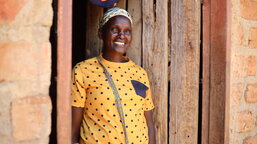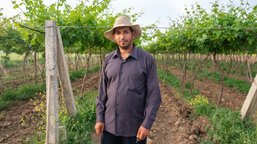Climate change affects us all. But did you know that the most affected are those who contribute to the changing climate least? In Africa and the Middle East the outcomes of climate change are most noticeable and the big impact on agriculture leads to food and water shortages in many countries. These factors and more put people all over the whole world in danger of going into poverty or having to flee their homes. Discover 7 facts about how climate affects people in disadvantaged regions.
1. People least responsible for climate change suffer the most from its consequences
Did you know that 3.6 billion people live in areas of high vulnerability? Especially the people in the most vulnerable positions are affected. The effects of climate change on agriculture cause many people to struggle to feed themselves and their families. Also, in the past 10 years developing countries have been hit eight times more by natural disasters than 40 years ago, which increases economic damage and drives people into poverty. It is estimated that over 130 million people are at risk of being pushed into poverty if climate change goes on without action taken.
2. Africa and the Middle East are particularly hit by climate change
In Africa and the Middle East, the consequences of climate change are especially noticeable. The regions are warming faster than the rest of the world. In certain areas of the Middle East, the combination of heat and humidity is forecasted to surpass or meet the limits of human tolerance and adaptability by the end of this century.
The temperature changes are expected to be followed by significant differences in rainfall. The majority of African farmers rely on rain-fed agriculture, which makes them vulnerable to the impacts of climate change. That causes a drastic decline in agricultural activity across the whole continent.
3. Agriculture is highly impacted by climate change
Agriculture is the source of livelihood for two-thirds of the population in developing countries, while it is highly impacted by climate change. Natural disasters or droughts are big challenges for farmers. The unpredictable changes in the weather and climate make it impossible for them to rely on the rainfall for their crops. High-intensity rainfalls lead to flooded fields, and low rainfall frequency leads to droughts and water scarcity. The reduced agricultural productivity affects food quality and its availability. That means many people in developing countries and regions severely impacted by climate change will not have enough food to feed themselves or their families, enhancing malnutrition and hunger.
4. Climate change causes food and water scarcity
The immense impact of climate change on agriculture also largely affects food and water shortages. The extreme weather conditions make it more difficult for farmers to grow crops, which leads to a food shortage. Due to the shortage, food prices increase, affecting primarily people living in poverty.
Climate change also affects the entire water cycle. High-water consumption for crops and water scarcity lead to droughts. Flooding and rising sea levels can contaminate the land and water resources with, for instance, saltwater and cause damage to water and sanitation infrastructure. In addition, extreme weather conditions lead to pollution of the water, which makes the access to drinking water even more limited.
5. Climate change drives displacement
The impacts of climate change worsen the basic living conditions and development opportunities for people in many countries. The outcomes of climate change cause that people cannot provide for themselves and their families anymore and have to leave their home countries. Both Africa and the Middle East, the regions significantly hit by the changing climate, are already grappling with numerous displacement crises, and the devastating impacts of climate change could exacerbate this by driving millions more from their homes due to water scarcity, drought, and extreme weather.
In 2022 alone, up to 84 percent of refugees and asylum seekers fled from highly climate-vulnerable countries. It is expected that there could be up to 1.2 billion climate refugees by 2050. Already, around 20 million people leave their homes each year due to natural disasters.
6. Climate change impacts conflicts
The climate crisis and its outcomes impact ongoing conflicts and increase the vulnerability of the already most affected communities. Growing competition for resources such as fertile land and clean water is already causing disruption in societies and displacing entire communities, intensifying ongoing conflicts and fueling new ones. Climate change also puts pressure on infrastructure and governance. Extreme weather conditions like drastic drought or flooding force many people to migrate, causing fights in communities.
7. Climate change increases risk of infectious diseases
The increasing temperatures caused by climate change raise the risk of exposing many people to deadly infections. It has already increased the risk of nearly 60 percent of all known infectious diseases, including tick- and mosquito-borne diseases, and various food and waterborne infections. Especially developing countries lack the resources and public health system to counteract against health outcomes increasing through climate change. The warmer climate can lead to estimated 21 million deaths by 2050, primarily caused by extreme heat, stunting, diarrhoea, malaria, and dengue.
Caritas Czech Republic helps people adapt to climate change
Caritas Czech Republic is supporting people living in areas affected by the changing climate to adapt to it. In the past years, we provided trainings in modern farming methods to farmers in Zambia and Iraq and introduced them to ways to farm in a changing climate and which drought-resistant seeds to plant. We are also using innovations to help farmers adapt to climate change. For example in Zambia, farmers got access to an app in which they can track rainfall or read useful information about what to grow in which season as well as take out insurance against climate risks. In Iraq, we provided farmers with modern irrigation systems so that they can use water efficiently and significantly reduce water consumption.
Moreover, in Moldova and Georgia, we also promote composting of organic waste to keep it out of landfills. We also built a functional and sustainable waste management system in the city of Criuleni in Moldova. In Mongolia, we help through trainings and awareness spreading about waste sorting, which already prevented 1500 tons of plastic to end up in the landfill.
We want to thank everyone that helps to protect the environment.














